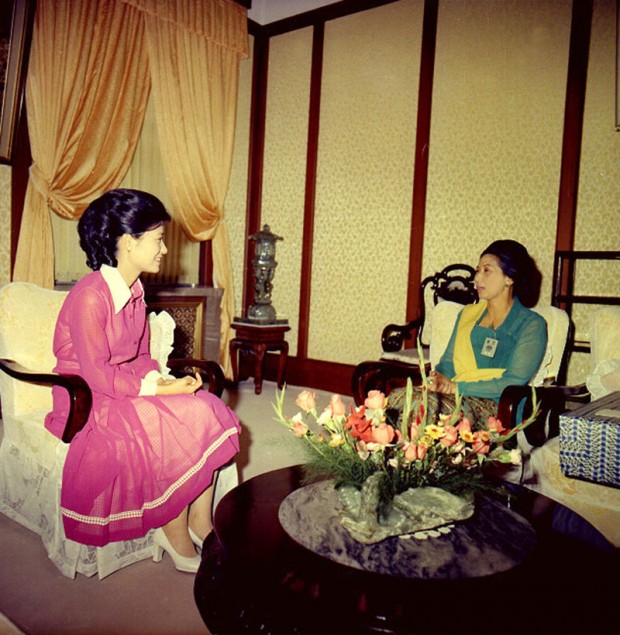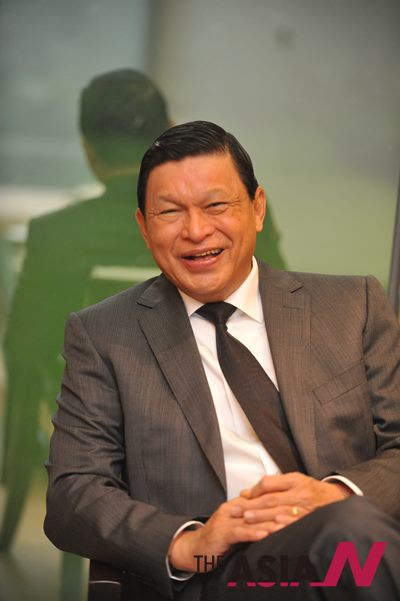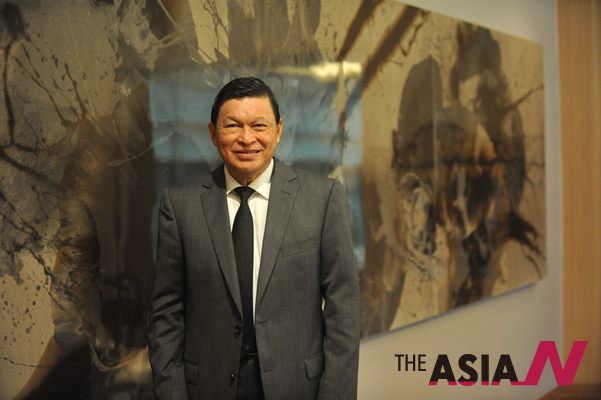“Want to be an effective salesman for Indonesia”
Interview with Indonesian Ambassador John Prasetio
Before being appointed as the ambassador to the Republic of Korea, John Prasetio was a businessman, holding positions such as Founder and Chairman of CBA Consulting, a Board Member of PT Bank Permata Tbk, PT Sarana Menara Nusantara Tbk, and Advisory Panel member of P&G Indonesia, Crowe Horwath Indonesia as well as Mitsui Indonesia. He was also a Special Staff to the Minister of Industry, and a member of the President’s National Economic Council.
As this year marks the 40th anniversary of Korean and Indonesian diplomatic relations, Amb. Prasetio shared about Korea and Indonesia bilateral relations in an interview with The AsiaN in July at the Indonesian Embassy in Seoul.
How has your experience being the Indonesian Ambassador to Korea been so far?
President Yudhoyono first asked me to become the next ambassador of Korea right after the Nuclear Summit in Seoul in 2012. I was a bit surprised and felt a little out of my comfort zone. At that time, I was working as a member of the President’s National Economic Council. I was a businessman and was used to communicating in a very straight forward manner and I knew diplomats had to be careful and speak between the lines.
I came to Korea last October and on December 6th, I submitted my credentials to President Lee Myung-bak. Soon after I arrived, I became the chairman of the ASEAN Committee Seoul for 6 months. When I was the chairman of the ASEAN committee, we paid a visit to the President-elect Park Geun-hye to congratulate her on her victory. I remember discussing what gift would be appropriate to give her and was told that a gift would not be proper, but flowers would be accepted. But, even in this case Madame Park would not be able to receive them directly. However, to my surprise, when we went to visit, Madame Park not only directly received the flowers we brought, but placed them in front of her during the entire meeting. We were very touched.
Another story I want to share is of when the Vice President Boediono of Indonesia attended Madame Park’s inauguration ceremony on February 25. When she shook Vice President Boediono’s hands, she said, “Happy birthday. Thank you for attending. I’m sorry to take you away from your grandchildren on this special day.” The Vice President Boediono was very shocked and moved. Madame Park’s sensitivity and being able to see the details is a great strength she possesses.
I have been enjoying my job so far. I am focusing much on establishing a network with the people of Korea more than solely serving the delegations arriving from Indonesia. During my term, I want to be an effective salesman for Indonesia and bring a positive brand image of Indonesia to Korea and I think this is only possible with a sufficient network. We try our best to be helpful to Korean businesses and firms and our ambition is to be the fastest and most cordial embassy in Seoul in terms of issuing visas.

Mme. Sunarti Sarwo Edhie Wibowo, spouse of Indonesia's first Ambassador to Korea, Mr. Sarwo Edhie Wibowo, (right) and Mme. President Park, Geun-hye who played the role of First Lady at the time (left) (Photo: Indonesian Embassy in Seoul)
This year is the 40th anniversary of Korea-Indonesian diplomatic relations. How do you feel about this?
Indonesia and Korea have remarkably strong relations, with no political tensions. The 40th anniversary provides a great opportunity to celebrate the accomplishments between the two countries and renew our commitment when looking ahead.
Asiana Airlines recently began a daily service between Seoul and Jakarta. Indonesia is currently one of the biggest importers of K-pop. It is also a key buyer of military equipment from Korea.
On September 25, we plan to hold a Gala dinner in celebration of the 40th year anniversary. At that time, we will have a contemporary fashion show in which the daughter-in-law of President Yudhoyono, a former model, has agreed to participate in. We will also hold a business forum for Korean businessmen and potential investors.
Indonesia is receiving much spotlight as an emerging market. Indonesia is famous for being a representative as a non-alliance country with strong pride during world conflict. How would you describe Indonesia today?
Indonesia today is a democratic country; we live in a land of freedom. We have freedom of speech and freedom of press. We are a growing economy; our GDP is around one trillion US dollars and the per capita income is about 400 US dollars, which labels us as a middle income country. We are also often described as a middle power country and together with Korea and Australia we are called KIA. In terms of our foreign policy, we think that in order for Indonesia to focus on economic development, we need to have a stable internal and external environment. There are a number of big powers in this region including China, the U.S. and Japan. So, what we are trying to do in Indonesia is to introduce the so called dynamic equilibrium; hence, we are seeking pluralism of power. That is to say that the future of this region, if you take an equalitarian stance, has to be shaped by all powers of the region, not just exclusively by big powers.
Indonesia has been playing its role in the East Asia Summit (EAS). The main objective of this summit is to create a cooperative frame work among the middle powers (Seoul, Jakarta and Canberra) and big powers (Beijing, Tokyo and New Delhi) to determine the shape of the future of this region. The summit is influential that in every event the president of the U.S., Barack Obama also joins. Basically, the EAS’s framework is to reduce the trust deficit in the region as in cases of Korea and Japan, and South Korea and North Korea. Indonesia believes that through this summit, if all powers can come and sit down at the presidential and the ministerial levels to discuss the trust deficit within the region, it can help them to know each other better and feel more comfortable. That is the attitude of Indonesia today.
All people in Indonesia must have a religion and 87% of the population is Muslim. However, I heard that Muslim faith in Indonesia is a little different from that of the Middle East. Could you please describe Indonesian Muslims?
The historical background why almost all Indonesians have a religion is due to the law introduced by former President Suharto. When he came to power defeating the Communist party in 1965, he abolished the communist rules. The rule that all must have a religion was enacted in order to block communism. It was mostly for political reasons.
As for Indonesian Muslims, I’m not an expert on Islam as I am not a Muslim myself, but there is this confusion from time to time between Arab culture and Islam. In Indonesia, we have strong local cultural heritage, which is different from Arab culture. Muslims in Indonesia follow the Quran and its teaching and thus will observe Ramadan. But, some habits of Indonesian Muslims are different from the culture you see in the Middle East due to local culture and customs. There are many Islamic peace organizations in Indonesia such as Nahdlatul Ulama.
Indonesia is a country of many races and religions. Constitutional law, religious law and customary law are all used. What do you think about having all 3 laws coexist?
First of all, I believe we need to simplify our legal system through a legal reform. Constitutional law and customary law are common in many countries. What makes our legal system a bit different is the religious law; the religious law, which is called Sharia law, was started when the government granted special autonomy to Aceh, an area hit by the tsunami in Indonesia. The government gave special authority to legalize Sharia law in this region. Afterwards, other regions also tried to introduce Sharia law. But, they first have to go through the parliamentary process before it is approved as it is not consistent with the constitution.
Indonesia’s abundant resources and young population are the driving force of its economy. On the other hand, the nation’s current account deficit and high fuel subsidies are seen as obstacles in Indonesia’s growth. What do you think about the persisting controversy concerning fuel subsidies?
The issue at hand was whether the removal of subsidies would create economic hardships for the poor or not. Yet, as the owner of cars are usually from the middle class, and the poor don’t drive cars, the fuel subsidies were actually helping the middle class and this is unfair to the poor. In June, the government tried to increase the fuel price by 44%. There was fear that the people might go to the streets and undertake some anti-government rallies, but it fortunately did not happen. This is because the government has treated the case nicely by taking some correcting measures and by explaining the issue to the people. You are right that we need to bring down our fiscal deficit, so why waste money on subsidies for the middle class? If we need to subsidize the poor, we must do it for the poor, not for the middle class.
Indonesia is predicted to grow to be the 7th largest economy in 2025. However, poor transportation infrastructure and government corruption are problems that need to be solved. There are several big development plans such as the Sunda Strait Bridge project. Could you tell us more about these projects?
Indonesia, believe it or not, is a very big country of 70,000 islands. Take for example Aceh, which is in the western part of Indonesia and Bakua, which is in the eastern part. The distance is more than 5,000 miles, which is equivalent to about 6 hours by plane. In terms of land area, we are eight times the size of Japan. The two main islands of Indonesia are Java, where Jakarta is and Sumatra. They are both heavily populated and are separated by the Sunda Strait by around 29 kilometers. Songdo bridge in Incheon is about 22 kilometers.
On the corner of Java you have factories such as POSCO. At the moment, trucks have to wait 5 hours or so, sometimes overnight to get on a ferry to cross to the other island. It is very inefficient and uneconomical. We need about 23 billion US dollars to build this bridge. If we build a bridge between these two islands, the people of other islands will start to complain why their island does not get a bridge.
There is also something called the ASEAN connectivity where Malaysia wants to build a bridge to connect with Sumatra. The Asia Development Bank suggested putting a bridge of 30 kilometers here. But, from Indonesia’s standpoint it is going to be a tough sell politically to connect one island to a foreign country when we are not able to connect our two key islands.
The process of economic development is sometimes called sequencing, deciding what has to come first. You have the political and economic approach and you have to answer questions from both sides. One of Indonesia’s biggest challenges is productivity and how to connect our many islands and how to connect to the outside world. Asiana Airlines recently connected Indonesia and Korea. And in the future, if there is a way to connect Malaysia and Sumatra by railway, it will definitely be done.
Indonesia has experienced good growth of its economy and by now we are a middle income level country with around a one trillion dollar GDP. And according to our projection, by 2025 our GDP is expected to be 4 trillion, 5 trillion or only 3 trillion dollars depending on the success of implementation of the already produced master plan. The master plan, which includes a number of key projects is designed to grow the economy to its potential during the specified period. These master plan key projects are a list of strategic projects, which add up to 470 billion US dollars targeted up to 2025. One of them is the Sunda Strait Bridge. The Sunda Strait project is a controversial project since it costs 23 billion dollars alone. Other projects include a 300km railway project across Sumatra, which runs from mining areas to the sea port.
When Korean companies invest in Indonesia, what should they take into consideration or be careful about?
There are quite a number of successful Korean companies. But for those who do not have experience doing business overseas, Indonesia is not the easiest place to do business. I feel we need to modernize and simplify our legal system. Obviously, to be successful like in any other place, Korean companies must understand the requirements. Their success depends on how much they know about Indonesia and its market opportunities. Their competence, who they know, and being comfortable with the people, business partners, etc. are also important.
I believe there is much potential to invest and do business in Indonesia. Many Koreans want to invest and I believe this is a show of confidence. I’m planning to organize a business forum this September the day after our anniversary dinner. While I have a few ministers in town, I will ask them to give a talk. I will also invite a number of Korean companies to share their experience in Indonesia.
Japanese and Chinese companies have been heavily investing in Indonesia. What areas or industries would Indonesia like Korea to invest in?
Korean companies can assess the master plan of the country and our industrialization road map and see their comparative advantage opportunities. Generally speaking, the government of Indonesia advises its provinces to come up with industrialization strategy/policy on the basis of its local advantages. Hence, Korean companies can make use of these local potential advantages by building bilateral business partnerships with the any of our provinces.
As Indonesia is rich in resources, I think there are opportunities in resource related businesses. The government is currently pushing to provide incentives to companies to process resources and raw materials.
In addition, Korean companies could have good business opportunities in the technology sector. After all, Indonesia has been asking Korea to produce green cars. Similarly, as 93% of the Indonesian automobile market is dominated by Japanese companies, the Korean companies can be competent business units. And as our citizens’ incomes are growing, the demand for quality electronic goods such as smart phones and refrigerators are increasing; this by itself is another entry direction for Korean companies like Samsung.
What have you been doing to strengthen relations between Korea and Indonesia and what are your future plans?
We try to have strong ties in almost every aspect. For instance, economic wise we are complementary. Generally speaking, Indonesian has a young population, growing economy which makes us a good potential market for Korean goods. Also, in terms of the defense industry, we need Korean assistance to help modernize our military industry. Although we have offers from Germany and other countries, we are very comfortable working with Korea. In politics, Indonesia is always in support of the peace process in the Korean peninsula. Generally, we are trying to promote the bilateral relations of the two countries in many aspects.
One of my missions is to promote Indonesian culinary in Korea as there are no Indonesian restaurants in Seoul. I need to be an effective salesman and promote Indonesia in Korea. I need to be helpful by trying to provide opportunities for businessmen in Korea to go to Indonesia and at the same time work to promote Indonesia products in Korea.
I heard many Indonesians are living in Ansan, Gyeonggi-do. How many Indonesians are living in Korea and what are their occupations?
There are a total of about 800 students in different universities and about 28,000 temporary migrant workers in various factories. The Korean government has the Employment Permit System (EPS), which basically invites 15 countries to supply workers; the total quota is 100,000 and is divided among these 15 countries and Indonesia is one of them. Only in Ansan, there are 1,400 Indonesian workers, where there are 31,000 workers from China.
Smoky haze from Indonesian forest fires has lately caused much trouble in Malaysia and Singapore. What do you think about this issue?
Because Indonesia is situated in very large tropical rain forest, there is sometimes the dry season, where it gets unpredictably very hot and triggers wild fires. As a result, a lot of people suffer from this hazard. This is also what happened in Arizona, U.S recently. I think some people died from the wildfires there. As the U.S. is a bigger country, the haze from wild fires may spread to another state, which does not bring about such a severe complain. However, as it happens here in Indonesia, the haze spreads to neighboring countries, and as a result causes neighbors to complain. Since we are an islands country, it is not only Indonesians who suffer from the hazard.
The forest fires are a natural phenomenon. Of course forest governance and vigilance needs to improve. But, as this issue is causing many people harm, people feel the need to blame a scapegoat, which then turns the focus on the cases of illegal clearing. I agree that there must be investigations on the illegal land clearing practices and appropriate measures should be taken.
However, the biggest issue at hand is how to deal with this natural phenomenon and how to use technology to deal with these fires. Similarly, due commitment has to be made on protecting our environment from degradation by enforcing comprehensive mechanisms such as a forestation and the like. And more important, there has to be regional collaboration on how to deal with this issue with neighboring countries as well.



























































